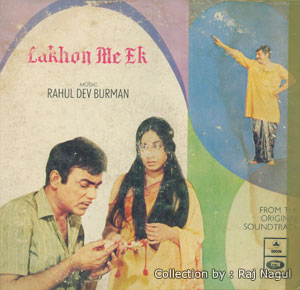Chanda O Chanda

Film: Lakhon Me Ek (1971)
Producer and Director: S.S. Balan
Lyricist: Anand Bakshi
Singers: Kishore Kumar and Lata Mangeshkar
Some songs in Bollywood’s music history can be regarded as “never-repeatable” songs. There are unique aspects that make them “once in a lifetime” compositions. The sheer seamless flow, the extraordinary passion and creativity content indicate that the composer−singer−song-writer−film-maker team had perhaps a point to prove. And purely going by the intense, dew-fresh quality of the output, it would appear they went about it as life and death, and as if there were no tomorrow. Akin to a cliché when some days food preparations at home seem to be the best you ever had…!
“Chanda o chanda” − a song from Lakhon Mein Ek − is one such music recipe. Seemingly very simple, but packs enough emotional wallop to linger long in memory and stir you deep inside. The hero Bhola (Mehmood) is a simpleton and a man for all in the neighboring locality. He is naive, innocent and cannot say “No.” One day he gets handed over a crying child to take care of and although he is studying for his English exam the next day, he is forced with this responsibility.
Bhola begins to calm the child by reciting the famous speech from Shakespeare’s Julius Caesar and even the well-known tune of the song “Mere saamne waali khidki mein” (from the movie Padosan). But the child still does not stop crying. As he begins to look skyward for an answer, he suddenly remembers the soothing calmness of the moon and sings a lullaby…as if to compliment it.
Kishore Kumar’s heartfelt rendition takes over with “Chanda o chanda, chanda o chanda, kisne churayi teri meri nindiya, jaage saari raina, tere mere naina”; the intense plea grows with each syllable. The then recent success of the film Aradhana had catapulted the singer to top slot as the 1970s dawned, with confidence beginning to show by the time this song was being recorded. Whatever Kishore touched during that period turned to gold as was the case with this one also. It is evident that the singer was in inspired zone, at his very best, giving it all he had.
“Hanske main tera man bahlaoon, apne ye ansoo magar kise mein dikhaoon” – these lines from the first antara tell you Bhola’s story. The words are also a triumph for the easy, lucid writing style of song-writer Anand Bakshi. As it is often mentioned, “It is easy to make simple things complex, but difficult to put across not-so-easy things in a simple manner.” And that is exactly what Anand Bakshi did in the song. The character Bhola has his own thoughts, feelings but because of his simple, accepting nature he is unable to let his inner identity surface and take over. The straight-from-the-heart singing takes the tale ahead with the second part of the antara, “Maine toh guzaraa, jeevan saara, besaharaa…” The empathy that Kishore Kumar brings out here cannot leave you unmoved.
Bhola’s recount continues with the second stanza: “Teri aur meri, ek kahani, hum donon ki kadar kisine na jaani; saathi yeh andhera, jaise mera, waise tera…” You can rightaway connect with the pain inside the person, thanks to the sincere voice and emoting. The song picturization now takes a sweet turn. In comes heroine Radha Saluja and wow! Lata Mangeshkar joins Kishore on the mike to hum the mukhda. The joy is doubled though Lata is heard for only 25 seconds or so! In fact, it is a dream climax to a sugary sweet tune.
Throughout, the orchestration is correctly restrained. Bare minimum use of the guitar, violins and the dholak is ensured. The song is substantial proof of the form composer R.D. Burman was in. The lullaby surely required understanding film song nuances and how well he delivered! The intelligent use of Lata speaks volumes of his often talked about genius. The indoor picturization is kept well in mind for the overall feel. All ample proof that R.D. was truly a well-rounded thinking composer!
Shankar Iyer
panchammagic.org

